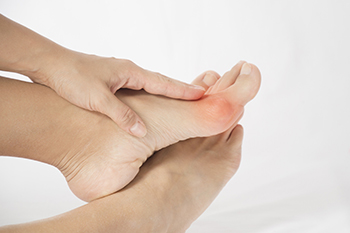
 Bunions are bony bumps that form on the sides of the big toes, at the base of the big toe joint. They are a common deformity that can push the big toe towards the other toes and make wearing shoes uncomfortable. While bunions can be surgically corrected, your doctor will usually suggest non-surgical treatments first. These treatments won’t cure the bunion, but they will relieve symptoms and can stop the bunion from getting worse. Wearing shoes with low heels and a wide toe box is helpful for relieving pressure on the bunion and makes walking more comfortable. Wearing orthotic inserts in your shoes can help support the foot and improve its alignment. Wearing a toe splint at night immobilizes the toe and holds it in a straighter position. Putting an ice pack on the bunion can help reduce swelling and pain. If you have bunions, please see a podiatrist to learn about more treatment options and find the right ones for you.
Bunions are bony bumps that form on the sides of the big toes, at the base of the big toe joint. They are a common deformity that can push the big toe towards the other toes and make wearing shoes uncomfortable. While bunions can be surgically corrected, your doctor will usually suggest non-surgical treatments first. These treatments won’t cure the bunion, but they will relieve symptoms and can stop the bunion from getting worse. Wearing shoes with low heels and a wide toe box is helpful for relieving pressure on the bunion and makes walking more comfortable. Wearing orthotic inserts in your shoes can help support the foot and improve its alignment. Wearing a toe splint at night immobilizes the toe and holds it in a straighter position. Putting an ice pack on the bunion can help reduce swelling and pain. If you have bunions, please see a podiatrist to learn about more treatment options and find the right ones for you.
If you are suffering from bunions, contact Dr. Todd Goldberg of Complete Family Foot Care Center. Our doctor can provide the care you need to keep you pain-free and on your feet.
What Is a Bunion?
A bunion is formed of swollen tissue or an enlargement of boney growth, usually located at the base joint of the toe that connects to the foot. The swelling occurs due to the bones in the big toe shifting inward, which impacts the other toes of the foot. This causes the area around the base of the big toe to become inflamed and painful.
Why Do Bunions Form?
Genetics – Susceptibility to bunions are often hereditary
Stress on the feet – Poorly fitted and uncomfortable footwear that places stress on feet, such as heels, can worsen existing bunions
How Are Bunions Diagnosed?
Doctors often perform two tests – blood tests and x-rays – when trying to diagnose bunions, especially in the early stages of development. Blood tests help determine if the foot pain is being caused by something else, such as arthritis, while x-rays provide a clear picture of your bone structure to your doctor.
How Are Bunions Treated?
If you have any questions, please feel free to contact our office located in Littlestown, PA . We offer the newest diagnostic and treatment technologies for all your foot care needs.